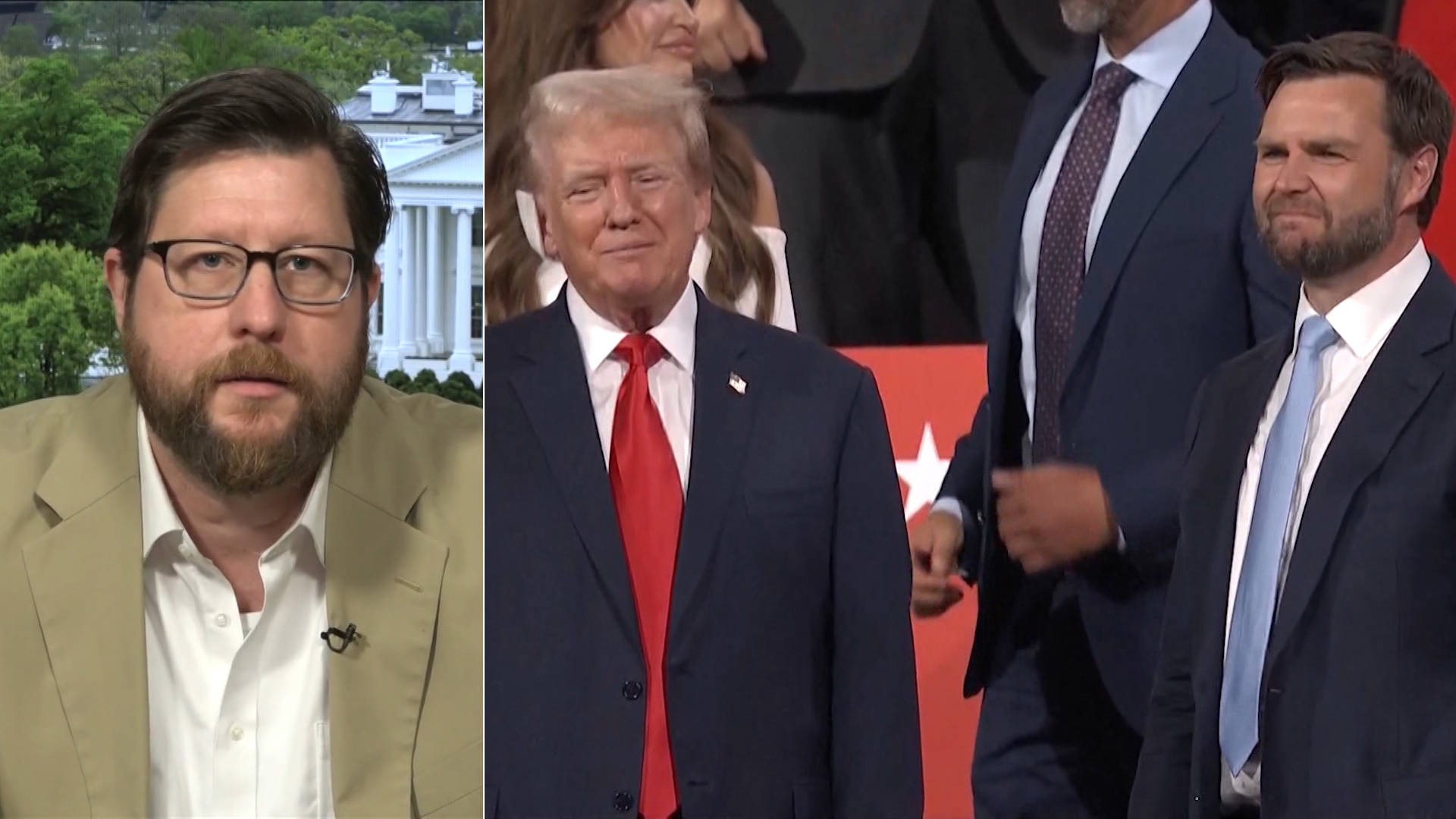This is a rush transcript. Copy may not be in its final form.
AMY GOODMAN: This is Democracy Now!, democracynow.org, “War, Peace and the Presidency: Breaking with Convention.” I’m Amy Goodman, with Nermeen Shaikh.
NERMEEN SHAIKH: We’re continuing our look at Donald Trump’s running mate J.D. Vance. As a senator, Vance has advocated for cutting aid to Ukraine, increasing support for Israel and taking a harder line on China. During his address on Wednesday night, he briefly spoke about foreign policy.
SEN. J.D. VANCE: Together, we will make sure our allies share in the burden of securing world peace. No more free rides for nations that betray the generosity of the American taxpayer.
Together, we will send our kids to war only when we must. But as President Trump showed with the elimination of ISIS and so much more, when we punch, we’re going to punch hard.
Together, we will put the citizens of America first, whatever the color of their skin. We will, in short, make America great again.
AMY GOODMAN: That was Republican vice-presidential nominee J.D. Vance, speaking for the first time as the Republican vice-presidential nominee Wednesday night here in Milwaukee at the Republican National Convention.
We’re joined in Washington, D.C., by Matt Duss, the executive vice president of the Center for International Policy, former foreign policy adviser to Senator Bernie Sanders.
Matt, welcome back to Democracy Now!
MATT DUSS: Thank you.
AMY GOODMAN: Near the beginning of J.D. Vance’s speech last night, he attacked President Biden for his support of the Iraq War — right? — when President George W. Bush led the United States into the war with Iraq on March 19th, 2003. He didn’t talk about President Bush. He didn’t say the president was Republican at the time. He did accurately say that, like Hillary Clinton, Joe Biden had supported that. But can you explain that? He himself had joined the Marines after the 9/11 attack and went to Iraq to serve in the Public Affairs Division in 2005.
MATT DUSS: Right. I think that’s generally consistent with the story he’s telling about his own political conversion, but the story he wants to tell America about Trumpism, about the MAGA movement, is that he was misled. He was told by Washington elites that this was a just war, a necessary war, and was lied to. So he did his duty as an American citizen and went to serve in the Marines in Iraq, but then came to realize that that war was based on a lie.
And, of course, that is a very valid argument. It was based on a series of lies and untruths, and had enormously disastrous effects, of course, for the region, but also for the United States. And that’s, again, an area where President Biden is quite vulnerable. He was a strong supporter of the Iraq War and, to this day, has never fully accounted for his support for the war.
NERMEEN SHAIKH: Right, Matt. And if you could talk about some of the other positions that Vance has articulated in the past, not just on Iraq, which he spoke about last night, but also Ukraine, Israel, Iran and, of course, China, which he sees as the greatest threat to the United States?
MATT DUSS: Right. I mean, I think if you look at what he’s saying and what he said in the past, you know, it’s very aligned with Trump. I think Trump does get credit for attacking the kind of foreign policy establishment, the hawkish Bush administration and the mistakes that they made, but also the foreign policy establishment more broadly, Democrats and Republicans, have made.
But if you look at the actual record of Trump’s presidency, it was, in fact, quite militarist. It was not isolationist. It was certainly not dovish in any respect. It was just unilateralist, I mean, and that, I think, is consistent with what we saw last night. It’s not that the United States will be pulling back from the world necessarily. It’s that we will be much more aggressive in advancing our own kind of perceived interests.
And if you look at some of the steps Trump took with North Korea, we came closer than ever before to a war with North Korea in 2017. We were on the brink of war with Iran in the wake of the assassination of Qassem Soleimani in January 2020. There was, of course, the attempt at regime change in Venezuela. So, again, I think it’s important to understand all of these in the background, even while we recognize the validity of the critique of the foreign policy establishment that we’ve seen from Trump and now from Vance.
AMY GOODMAN: Let’s go to Senator J.D. Vance speaking earlier this year, because he didn’t talk that much about foreign policy in this address at the RNC, but speaking earlier this year about U.S. relations with Israel and what he would like to see in the future.
SEN. J.D. VANCE: A big part of the reason why Americans care about Israel is because we are still the largest Christian-majority country in the world, which means that a majority of citizens of this country think that their savior — and I count myself a Christian — was born, died and resurrected in that narrow little strip of territory off the Mediterranean. The idea that there is ever going to be an American foreign policy that doesn’t care a lot about that slice of the world is preposterous because of who Americans are. …
We have a real opportunity to ensure that Israel is an ally in the true sense. But it’s going to pursue their interests, and sometimes those interests won’t totally overlap with the United States’, and that’s totally reasonable. But they are fundamentally self-sufficient. And I think the way that we get there in Israel is actually by combining the Abraham Accords approach with the defeat of Hamas that gets us to a place where Israel and the Sunni nations can play a regional counterweight to Iran — again, we don’t want a broader regional war. We don’t want to get involved in a broader regional war. The best way to do that is to ensure that Israel, with the Sunni nations, can actually police their own region of the world.
NERMEEN SHAIKH: So, Matt, if you could respond to what Vance said earlier this year? You’ve just co-authored a piece with Daniel Levy, “In the U.K. and France, There Was a Gaza Vote. And in the U.S.?” And here we have Vance talking about bolstering U.S. relations with Israel. And he was speaking, of course, in the midst the war. Israel’s assault on Gaza had been happening for several months when he spoke.
MATT DUSS: Sure. I mean, I think there’s two parts of that, of what you just played, those remarks from Vance. First is, what he said at the beginning about the kind of political support from many Americans, particularly Christian Americans — and, you know, I myself grew up in the Evangelical Church, so I can relate to what he’s talking about. There is a deep understanding, a deep sympathy, culturally, religiously and politically, for the state of Israel, for a whole bunch of reasons. I think that is valid. It’s important to understand that.
But I think there’s a separate conversation about what is the correct policy, if people care about Israel, what actually leads to security, not just for Israelis but to Palestinians, for Palestinians, and for people across the region. And I think that is where we’re going to have real disagreement.
You heard Trump — you heard Vance, excuse me, praising the Abraham Accords. And unfortunately, the Abraham Accords are simply not a formula for genuine security. It’s important to understand what the countries in the region — Israel, you know, the United Arab Emirates, some of these other undemocratic and repressive countries — see the purpose of the Abraham Accords as. And that is sustaining their own undemocratic rule. So, I think that, ultimately, is not going to be a formula either for security for Israel in the long term, certainly not for the Palestinians. I think the fact that — you know, I don’t want to blame the Abraham Accords for October 7 attacks, but I will note that the logic behind the Abraham Accords, which is that the Palestinians can just be pushed to the side and kind of just managed in perpetuity, that is the logic in which, the environment in which the October 7 attacks happened. We have to understand that.
Now, unfortunately, this is not an area where the Biden administration is able to offer a counterargument, because President Biden himself has adopted the Abraham Accords and now, you know, kind of pretends that they can be a basis for regional peace and security, which they cannot.
AMY GOODMAN: Matt, we would be remiss, in this last 30 seconds, if we didn’t ask you a quick question about Biden now having COVID. Biden is so close to Bernie Sanders, your former boss. We just have 20 seconds. But do you see Biden stepping aside? And the significance of this moment?
MATT DUSS: I mean, it’s hard to predict, but I will say that the concerns from a lot of Democratic leaderships have not gone away. That is where we are now. And I think the COVID diagnosis only adds to that.
AMY GOODMAN: Well, Matt Duss, we want to thank you so much for being with us, executive vice president of the Center for International Policy, former foreign policy adviser to Senator Bernie Sanders, who just recently met with President Biden. Stay tuned for another hour of our special “Breaking with Convention” coverage right here at Democracy Now!











Post comments (0)